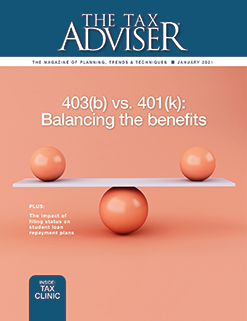- column
- From the Tax Adviser
Effect of delayed filings on statute of limitation
Please note: This item is from our archives and was published in 2021. It is provided for historical reference. The content may be out of date and links may no longer function.
Related
Businesses urge Treasury to destroy BOI data and finalize exemption
How to ease taxes on inherited IRAs
Company lacks standing to sue ERTC advisers
TOPICS

In 2020, the IRS postponed the April 15, 2020, statutory due date for filing returns and paying taxes due for tax year 2019 to July 15, 2020. This postponement under Sec. 7508A was a form of authorized delay, but it was not an extension.
The IRS may specify a period of up to one year that may be disregarded in performing certain acts for taxpayers affected by a federally declared disaster (Sec. 7508A; see also Rev. Proc. 2018-58). Like a weekend, legal holiday, or authorized extension, a postponed date under Sec. 7508A allows a return or a refund claim to be considered timely filed if it is filed by the postponed date (Regs. Sec. 301.7508A-1(b)(4)).
When would the Sec. 6501(a) three-year assessment period begin, and when is a refund claim timely for tax year 2019? Returns filed before April 15, 2020, are deemed filed on that date, so both the assessment and refund filing statutes of limitation would begin April 15, 2020, regardless of the postponement or any authorized extension. A refund claim must be filed by April 17, 2023 (because April 15, 2023, falls on a Saturday). If the initial return is filed between April 16 and July 15, 2020, then both statutes begin on the exact date the return is filed. (The return for purposes of Sec. 6511 is the initial return; neither a superseding original return nor an amended return tolls the statute (see Chief Counsel Advice 202026002).) However, the Sec. 6511 refund claim lookback statute only considers extensions, not postponements, when counting back. Therefore, a taxpayer who relied on the postponement and filed a return on July 15, 2020, should recognize that although a refund claim might be timely filed by July 17, 2023 (July 15 falls on a Saturday), the three-year lookback period will not reach taxes paid prior to (and deemed paid on) April 15, 2020. This taxpayer should file a claim by April 17, 2023.
What if the same taxpayer filed on July 15 but had an authorized extension to Oct. 15, 2020, in addition to the Sec. 7508A postponement? In this case, the assessment and refund claim filing statutes still begin on July 15, 2020, the date the return is filed, but because there is an extension, a refund claim filed on July 17, 2023, would reach back to April 15, 2020, because the lookback adds the extension time. The same would be true if the initial return was filed on any date up to and including Oct. 15, 2020, provided there is an approved extension.
What if the Oct. 15, 2020, extended due date was postponed under Sec. 7508A to Jan. 15, 2021, due to a natural disaster affecting the taxpayer? In this situation, the assessment and refund filing limitation statutes will still run from the actual date filed, even if Jan. 15, 2021, becomes an authorized date for a timely filed tax year 2019 return. A taxpayer who files on Jan. 15, 2021, could file a timely claim for refund by Jan. 16, 2024 (Jan. 15 is a legal holiday), but as with the taxpayer who filed on July 15, 2020, without an extension, the claim would be outside the lookback period for taxes deemed paid on April 15, 2020. This taxpayer needs to file a refund claim by Oct. 16, 2023, (Oct. 15 is a Sunday) to fall within the lookback period. It is important to reiterate that the three-year assessment and refund limitation statutes do not automatically begin on the Jan. 15, 2021, postponed date, but rather only if the return is filed on that date.
For a detailed discussion of the issues in this area, see “DC Currents: Taxpayers Need to Know Their Limitations,” in the January 2021 issue of The Tax Adviser.
— Evan M. Stone, J.D., LL.M.
The Tax Adviser is the AICPA’s monthly journal of tax planning, trends, and techniques.
Also in the January issue:
- A discussion of distributions from 403(b) plans.
- A look at filing status and student loan repayment plans.
- An analysis of the authority of IRS FAQs.
AICPA members can subscribe to The Tax Adviser for a discounted price of $85 per year. Tax Section membership includes a one-year subscription to The Tax Adviser.


















